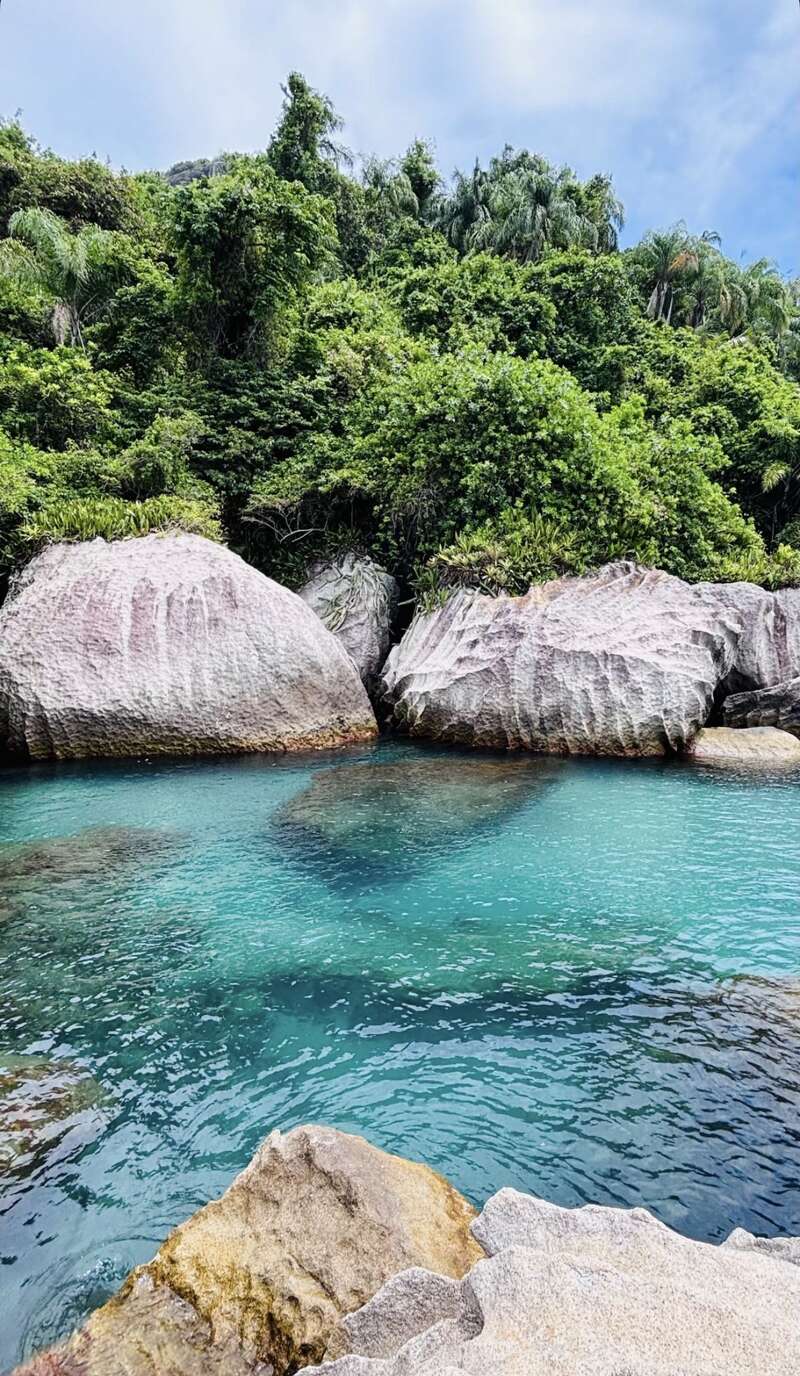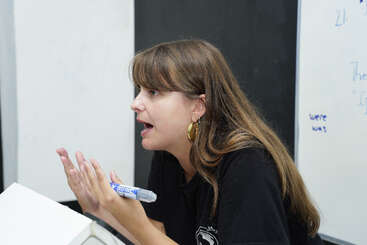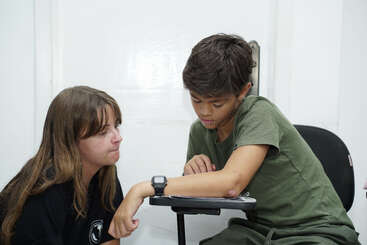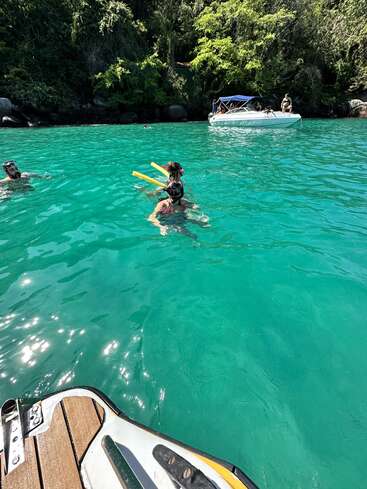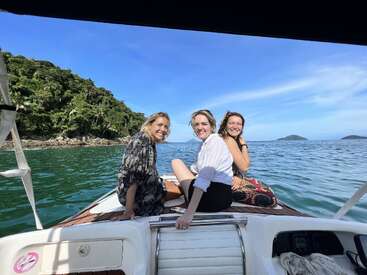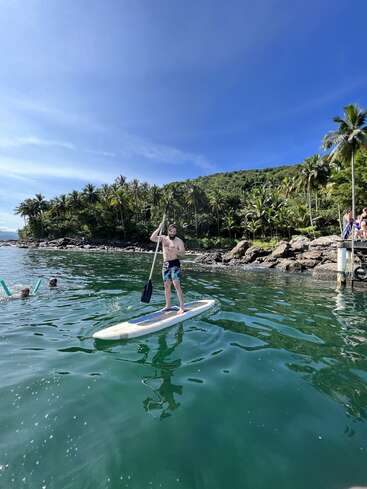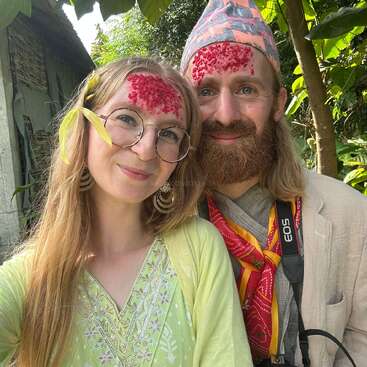Profile information

Host rating
100 %

Last replied
18 Feb 2026

Reply rate
93.8 %
Usually responds within 8 days

Feedback
39

ID verified

Email verified
Country info
Badges (4)





Find your perfect host
Details

Description
Hi there!
Our program provides interactive English lessons for beginner to intermediate levels, running Monday through Friday.
We invite international volunteers to give our students a real-world experience of English, exposure to diverse accents, and a chance to engage in cultural exchange. This helps them broaden their horizons and imagine life beyond Brazil.
Our mission is to make quality language education accessible, fostering opportunities, building connections, and enriching lives through the power of learning.
Types of help and learning opportunities
Language practice
Teaching

Interests
Self developmentLanguagesBeach
Cultural exchange and learning opportunities
In São Sebastião, you’ll have the chance to truly experience the local way of life and connect with the community. We’re located just 1.5 kilometers from the beach!
The region has so much to offer: stunning beaches, excellent surfing, adventurous hikes, crystal-clear freshwater pools and waterfalls, and unforgettable excursions to nearby islands. There’s always something new to explore.
Projects involving children
This project could involve children. For more information see our guidelines and tips here.

Help
We ask for a minimum stay of 4 weeks to foster meaningful connections, as our culture values relationship-based communication.
You’ll teach conversational English to students of all ages (beginner to intermediate) in an interactive way—no Portuguese required! While native-level fluency isn’t necessary, an advanced level of English is essential.
In addition to regular lessons, you’ll lead a workshop where students can practice English naturally, whether by sharing your culture, skills, or interests. It’s a great way to create an immersive, travel-like experience for them!
Languages
Languages spoken
English: Fluent
Portuguese: FluentThis host offers a language exchange
This host has indicated that they are interested in sharing their own language or learning a new language.
You can contact them directly for more information.
Accommodation
Accommodation:
You’ll be part of our host family during your stay. When you’re here, you’re not just a volunteer, you become part of our family. We share the kitchen, the school’s social spaces, and the classrooms, all located within one large building.
Volunteers stay in a private room with two comfortable beds, shared with one other volunteer. The room is separate from the main house and located right by the pool, offering extra privacy and a peaceful atmosphere. It also includes a private bathroom.
Meals:
Given that volunteers may have different dietary preferences, we've found it easiest to let volunteers cook for themselves.
In exchange for your help teaching, we provide accommodation and ingredients for two meals per day—breakfast and dinner—each week. You’ll have full access to the kitchen to prepare your own meals.
While many Brazilian dishes include meat or fish, it’s very easy to maintain a vegetarian diet here thanks to the abundance of fresh fruits and vegetables.
What else ...
A BIT MORE INFO ON FOOD EXPECTATIONS...
Travel is all about adapting, changing routines, letting go of comforts, and discovering new things. Of course, it can feel more challenging if you have dietary restrictions, allergies, or if you’re a selective eater. But that shouldn’t hold you back from experiencing places with different food cultures.
One of the beautiful lessons of travel is learning to release some of the habits consumerism has given us, like expecting everything to be organic, sugar-free, or additive-free. Being open and flexible with food is part of making the most of your journey.
Each week, we’ll ask you to share a simple meal plan and shopping list, noting any preferences or restrictions. Once your weekly ingredients are used up, though, any additional food will be your responsibility. And if you’d like extra snacks or specialty items (which can be pricier here in Brazil), you’re welcome to purchase those separately.
A BIT MORE INFO ON TEACHING...
This is, first and foremost, a teaching position, which means strong communication skills are essential. Teaching isn’t just about knowing the language, it’s about connecting with others, being patient, explaining clearly, listening actively, and adapting to the needs of different learners.
At its core, teaching is about building understanding. It’s about helping others feel confident, supported, and motivated to learn. Clear pronunciation, good grammar, and the ability to communicate ideas effectively are key parts of creating a positive and productive learning environment for our students.
A little more information

Internet access

Limited internet access

We have pets

We are smokers

Can host families

Can host digital nomads
Good wi-fi all day!

How many Workawayers can stay?
Two

My animals / pets
Amy (15 years)
Chat with Workawayers who've visited this host


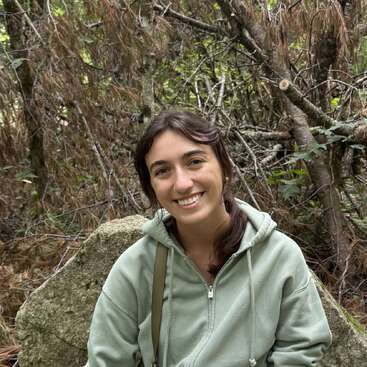



Feedback (22)
They live in a town called Boiçucanga, a place filled with life, culture, sports, beaches, hikes and then sits along the Litoral Coastline, lined with endless things to explore
The hours are… read more
You embraced our routines, our culture, our food and you brought so much… read more
Photos
Chat with Workawayers who've visited this host






Feedback
These are extra optional ratings when members leave feedback. The average rating left for each option is displayed.
Accuracy of profile:
(4.9)
Cultural exchange:
(5.0)
Communication:
(4.9)
They live in a town called Boiçucanga, a place filled with life, culture, sports, beaches, hikes and then sits along the Litoral Coastline, lined with endless things to explore
The hours are… read more
You embraced our routines, our culture, our food and you brought so much… read more
They also helped me truly embrace Brazil and its vibrant culture. From the delicious food cooked by Dayana’s… read more
It was… read more
You went above and beyond the classes, engaging with the… read more
Dayana and Haroldo have created such a welcoming home, and I feel incredibly lucky to have been a part of their family. Even though I had plenty of freedom and… read more
We greatly enjoyed our time together as well, sharing laughs and engaging in meaningful conversations. Your presence added so much… read more
From the moment I arrived, they made me feel so welcome into their home and the school. They are so generous and such fun people to be around, we had many laughs and… read more
We're thrilled that you enjoyed your time at the school… read more
The first thing that struck me upon arriving at the school was the genuine kindness and helpfulness of everyone involved. Diana and Haroldo told me on the… read more
My dad is Brazilian, and I came to… read more
I had an unforgettable experience here with Dayana and her family.
She is an amazing host, who really cares about you and your needs, her community and the children who come to her school.
I ate tons of traditional food, tried lots of weird different fruits, danced endless nights of salsa, learnt about Brazilian culture and history, learnt… read more
It was fantastic sharing my culture and teaching English with the students… read more
In your Workaway profile you said “I can adapt easily to… read more
The classes were… read more
We taught about 4-5 classes a day, Monday through Thursday. The school is located steps from a beautiful beach! Dayana was very… read more
The surroundings are very beautiful, beaches, islands,… read more
Dayana and Fernando do a great job with their language school and we had so much fun teaching English and helping them. It was always very clear of what was expected to do from us and we helped everywhere where needed, with a lot of… read more
